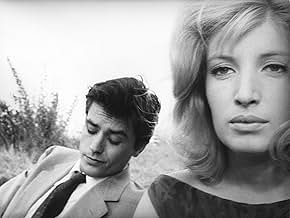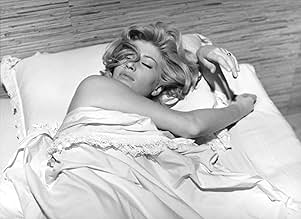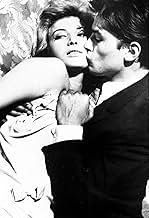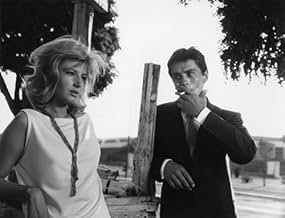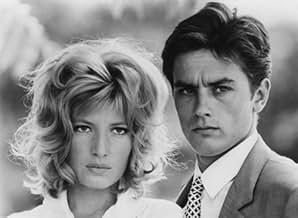IMDb RATING
7.7/10
24K
YOUR RATING
A young woman meets a vital young man, but their love affair is doomed because of the man's materialistic nature.A young woman meets a vital young man, but their love affair is doomed because of the man's materialistic nature.A young woman meets a vital young man, but their love affair is doomed because of the man's materialistic nature.
- Awards
- 1 win & 5 nominations total
Cyrus Elias
- Intoxicated Man
- (uncredited)
Alba Maiolini
- Woman at the Stock Market
- (uncredited)
Featured reviews
While The Eclipse is one of the most superbly directed films I may have ever seen, on a first impression it was (obviously) a lot to take in all at once. As with his other films, L'Eclisse isn't for everyone. But Antonioni distinguishes himself here as a great artist of the medium by not only creating the kinds of compositions (lensed by Gianni De Venanzo, who worked with Antonioni on Il Grido and La Notte as well as the WW2 documentary Days of Glory and Fellini's 8 1/2) no one could ever justifiably imitate correctly, but creating a depth to the substance. On one hand one aspect of L'Eclisse that's appealing is how it balances out the style and substance (though the style is arguably the more distinguishable and greater than the two). On the other another aspect is that it could put off viewers not terribly familiar with Antonioni's psychology (which, like Scorsese for example, is at least consistent and engaging with the rest of the director's catalog of work). How intently he gets inside Vittoria's head, and at the same time maintains a detachment despite the varying emotional contexts, is extraordinary, if highly personal.
Like Vittoria, Antonioni does something that's fascinating throughout the film - though one doesn't know what it is exactly that holds Vittoria, and for that matter Piero, in their respective attitudes, one doesn't feel quite left out of anything heart-stopping for the story/character's sake. The film lets us in just enough as to no keep us curious, and it also doesn't keep itself in a depressive tone, as it is realistic to how the people in this city exist. In fact, there's another facet to L'Eclisse which especially worked for me - the poetry that slips itself in small doses amid the visual sweep. Whether it be one of the long takes, an elongated view on a building or street-light, or on Vitty as Vittoria, it's in the observation that subtext forms. This is the kind of motion picture that a shot-by-shot analysis would serve like would a Picasso or Chagal.
And as a plus to the film's success are the actors turns - Monica Vitti is the only actress from that period and country I can think of who could've pulled off what Antonioni wanted in Vittoria. Her face, after being in front of us minute after minute, becomes familiar despite her inner-angst. She knows what Vittoria's fears and loss of vitality means for the story. She's not a person without a laugh or smile ever, yet those emotions arrive only after the known mood is peeled away like a layer of skin. "To love I think one shouldn't know the other," she says, almost arbitrarily. "But then, maybe one shouldn't love at all." Is this Antonioni hitting the hammer on the head, or is it just one of those kinds of comments a woman like her would make? As in L'Avventura, there is the mystery around the female lead. Is love beyond her reach we might wonder, or has the idea of it vanished under false pretense? Alain Deleon also deserves credit for his Piero, as he counters her quiet, more fogged demeanor as a stockbroker in Rome. That under current to the story - the major bustle and noise of the gamblers in the stockbroker's hall - is also part of the contrast, to the stretches with minimal dialog and sound.
The last act, which regards Vittoria's relationship to Piero (a time after he empty break-up with her past lover Rodrigo) culminates in an astonishing feat of storytelling and film-art. As it becomes all the more evident neither one will arrive at a certain (usually) desolate cross-road corner to meet up, the idea of an eclipse over these people and places is hypnotic, unique. For its time it must've been quite a stroke by a director, and forty or so years later the whole sequence leaves its effect in due. Haunting formations beneath and surrounded by the sky and clouds, and it's a bit intellectually loaded. There can be any interpretation for this climax (or as one could claim an anti-climax) that isn't manipulated by Antonioni. The sequence, as with the rest of the film, asks only to see the world based on how one would think it can, or will, be seen. And it fits memorably, like bedroom slippers, into the prime of Antonioni's career as an auteur.
Among the three films in Antonioni's films from this period of his career (1960-1962), this is the one I'd recommend the highest. The Eclipse is also the kind that's nearly mandatory to see more than once if sincerely interested in checking out at all (in other words, don't watch it with pre-conceived notions of this being a dramatic love story with solid conventions to it).
Like Vittoria, Antonioni does something that's fascinating throughout the film - though one doesn't know what it is exactly that holds Vittoria, and for that matter Piero, in their respective attitudes, one doesn't feel quite left out of anything heart-stopping for the story/character's sake. The film lets us in just enough as to no keep us curious, and it also doesn't keep itself in a depressive tone, as it is realistic to how the people in this city exist. In fact, there's another facet to L'Eclisse which especially worked for me - the poetry that slips itself in small doses amid the visual sweep. Whether it be one of the long takes, an elongated view on a building or street-light, or on Vitty as Vittoria, it's in the observation that subtext forms. This is the kind of motion picture that a shot-by-shot analysis would serve like would a Picasso or Chagal.
And as a plus to the film's success are the actors turns - Monica Vitti is the only actress from that period and country I can think of who could've pulled off what Antonioni wanted in Vittoria. Her face, after being in front of us minute after minute, becomes familiar despite her inner-angst. She knows what Vittoria's fears and loss of vitality means for the story. She's not a person without a laugh or smile ever, yet those emotions arrive only after the known mood is peeled away like a layer of skin. "To love I think one shouldn't know the other," she says, almost arbitrarily. "But then, maybe one shouldn't love at all." Is this Antonioni hitting the hammer on the head, or is it just one of those kinds of comments a woman like her would make? As in L'Avventura, there is the mystery around the female lead. Is love beyond her reach we might wonder, or has the idea of it vanished under false pretense? Alain Deleon also deserves credit for his Piero, as he counters her quiet, more fogged demeanor as a stockbroker in Rome. That under current to the story - the major bustle and noise of the gamblers in the stockbroker's hall - is also part of the contrast, to the stretches with minimal dialog and sound.
The last act, which regards Vittoria's relationship to Piero (a time after he empty break-up with her past lover Rodrigo) culminates in an astonishing feat of storytelling and film-art. As it becomes all the more evident neither one will arrive at a certain (usually) desolate cross-road corner to meet up, the idea of an eclipse over these people and places is hypnotic, unique. For its time it must've been quite a stroke by a director, and forty or so years later the whole sequence leaves its effect in due. Haunting formations beneath and surrounded by the sky and clouds, and it's a bit intellectually loaded. There can be any interpretation for this climax (or as one could claim an anti-climax) that isn't manipulated by Antonioni. The sequence, as with the rest of the film, asks only to see the world based on how one would think it can, or will, be seen. And it fits memorably, like bedroom slippers, into the prime of Antonioni's career as an auteur.
Among the three films in Antonioni's films from this period of his career (1960-1962), this is the one I'd recommend the highest. The Eclipse is also the kind that's nearly mandatory to see more than once if sincerely interested in checking out at all (in other words, don't watch it with pre-conceived notions of this being a dramatic love story with solid conventions to it).
It only takes a few films to become familiar with the methodic ways of Michelangelo Antonioni. Themes of alienation, disconnection, romance without the romance and dealing with an ambiguous existential way of life. It's fascinating but challenging. I came into L'Eclisse wanting to love it because I love L'Avventura and Blowup but deliberately hard to connect to. We're thrown into a vague but disheartening scenario with depressed characters and just have to follow down that road. It has rich cinematography that has beautiful composition, but an gut- sinking emptiness. It's almost too precise and too self-aware. But that's the beauty of the film, its aesthetic is not supposed to be pleasing, even though artistically it should be. In fact, it's painful. Painful to watch the busiest life of the film being at the stock market while the rest of nature is desolate yet so picturesque. Machines and technology are prominent throughout the film and often physically get in the way of human relationships. The film is a profound and quietly poignant statement on human desires and insecurities, if a little held back by a touch of pretence and too cold for its own good.
8/10
8/10
L'Eclisse (1962) is a profoundly artistic, wonderfully crafted modern Italian film, in which the audience is permitted to draw their own conclusions about what they are seeing on the screen.
Unlike most directors, who construct their films in very specific, traditional ways to tell stories they wish to convey, in L'Eclisse the director Michelangelo Antonioni paints pictures which mean different things to different people. It's an open-ended story and the audience is allowed and actually encouraged to come up with their own theories about the main plot and sub-plots, the overall themes, and the characters' motivations and personalities. None of them are carved in stone. You yourself can travel to a very special, unique place by watching L'Eclisse, and it can be a very different journey than someone else's.
What do the white lines mean to you? They show up several times in compositional frames in the film: on the street, on the runway when the plane lands, outside a church, and in more abstract ways in signposts, in clothing, in architecture. Is an actual eclipse taking place when darkness descends and the street light suddenly goes on? or has nighttime simply fallen and we're left with a sense of desolation and obliteration of the modern city? has the city been hit by a nuclear bomb? The mushroom water tower: does it just signify the nuclear age, or is it a real omen for the future of mankind? Is it not also a phallic symbol, showcasing the director's idea that the stockbroker character is primarily interested in towering conquests, and that sexuality is an underlying motivation of the main female character's psyche, even though she also seems afraid of intimacy and commitment? The man riding the horse and buggy and the nursemaid pushing the baby buggy: do these things just mark the passage of time? or do they have a deeper meaning that represents the old world, a world that is quickly disappearing from the modern landscape? Is the final scene between the couple the end of their relationship, or are they about to become more serious? Questions like these can be answered in different ways, depending on your own perspective.
This was a novel approach to film-making in 1962, and actually it's also still novel today too! How many films dare to resemble L'Eclisse in the 21st century? Today films are too formulaic and rarely is the same creativity expressed that Michelangelo Antonioni achieved so sublimely in his film. If I was a filmmaker this would be the kind of film I would love to make, full of symbolism and repressed emotions.
The cinematography is exquisite in this film. The new Criterion double disc set did a fantastic job with the print and the extras. My suggestion would be to watch the film without commentary and then immediately afterward watch it again with the commentary on. As he talks you will find yourself noticing things you missed the first time around, and that the commentator is missing too! For instance, notice how in the scene when the ladies are chasing the dogs who have escaped the apartment, that Vittoria approaches two dogs, a white and a black one, and it's the black dog who gets up and dances and charms her, an analogy to the previous scene, in which Vittoria had put on black-face and did an African dance in her racist friend's apartment. The white dog blithely walks away, representing the stifling racist views of her friend Marta, and the black dog shows joy of movement and a fun nature, like Vittoria. The commentator completely misses this message.
Acting is superb by all three leads, Monica Vitti, with her finely chiseled face and wild blonde hair, Alain Delon, who conveys emotions easily with just the flick of an eyebrow, and Francisco Rabal, classically handsome and intense. Also of note is the actress who plays Vittoria's mother, Lila Brignone, who does a good job depicting the emotional distance the character feels from the estranged daughter, which in turn conveys to the audience one of the primary reasons Vittoria is afraid of intimacy: she never had a demonstrative relationship with her mother.
If you're a fan of Italian cinema, don't miss L'Eclisse. It's a special film which will stay with you long after you've seen it.
10 out of 10.
Unlike most directors, who construct their films in very specific, traditional ways to tell stories they wish to convey, in L'Eclisse the director Michelangelo Antonioni paints pictures which mean different things to different people. It's an open-ended story and the audience is allowed and actually encouraged to come up with their own theories about the main plot and sub-plots, the overall themes, and the characters' motivations and personalities. None of them are carved in stone. You yourself can travel to a very special, unique place by watching L'Eclisse, and it can be a very different journey than someone else's.
What do the white lines mean to you? They show up several times in compositional frames in the film: on the street, on the runway when the plane lands, outside a church, and in more abstract ways in signposts, in clothing, in architecture. Is an actual eclipse taking place when darkness descends and the street light suddenly goes on? or has nighttime simply fallen and we're left with a sense of desolation and obliteration of the modern city? has the city been hit by a nuclear bomb? The mushroom water tower: does it just signify the nuclear age, or is it a real omen for the future of mankind? Is it not also a phallic symbol, showcasing the director's idea that the stockbroker character is primarily interested in towering conquests, and that sexuality is an underlying motivation of the main female character's psyche, even though she also seems afraid of intimacy and commitment? The man riding the horse and buggy and the nursemaid pushing the baby buggy: do these things just mark the passage of time? or do they have a deeper meaning that represents the old world, a world that is quickly disappearing from the modern landscape? Is the final scene between the couple the end of their relationship, or are they about to become more serious? Questions like these can be answered in different ways, depending on your own perspective.
This was a novel approach to film-making in 1962, and actually it's also still novel today too! How many films dare to resemble L'Eclisse in the 21st century? Today films are too formulaic and rarely is the same creativity expressed that Michelangelo Antonioni achieved so sublimely in his film. If I was a filmmaker this would be the kind of film I would love to make, full of symbolism and repressed emotions.
The cinematography is exquisite in this film. The new Criterion double disc set did a fantastic job with the print and the extras. My suggestion would be to watch the film without commentary and then immediately afterward watch it again with the commentary on. As he talks you will find yourself noticing things you missed the first time around, and that the commentator is missing too! For instance, notice how in the scene when the ladies are chasing the dogs who have escaped the apartment, that Vittoria approaches two dogs, a white and a black one, and it's the black dog who gets up and dances and charms her, an analogy to the previous scene, in which Vittoria had put on black-face and did an African dance in her racist friend's apartment. The white dog blithely walks away, representing the stifling racist views of her friend Marta, and the black dog shows joy of movement and a fun nature, like Vittoria. The commentator completely misses this message.
Acting is superb by all three leads, Monica Vitti, with her finely chiseled face and wild blonde hair, Alain Delon, who conveys emotions easily with just the flick of an eyebrow, and Francisco Rabal, classically handsome and intense. Also of note is the actress who plays Vittoria's mother, Lila Brignone, who does a good job depicting the emotional distance the character feels from the estranged daughter, which in turn conveys to the audience one of the primary reasons Vittoria is afraid of intimacy: she never had a demonstrative relationship with her mother.
If you're a fan of Italian cinema, don't miss L'Eclisse. It's a special film which will stay with you long after you've seen it.
10 out of 10.
In the suburb of Rome, the translator Vittoria (Monica Vitti) breaks her engagement with her boyfriend, the writer Ricardo (Francisco Rabal), after a troubled night. Vittoria goes to downtown to meet her mother (Lilla Brignone), who is addicted in Stock Market, and she meets the broker Piero (Alain Delon) in a day of crash in the Stock Market. The materialist Piero and the absent Vittoria begins a monosyllabic relationship.
"L'Eclisse" is a love story in the world of Michelangelo Antoniani, where the lack of communication, emptiness and loneliness in the big city prevails over the human feelings. The first ten or fifteen minutes with Vittoria and Riccardo alone in his apartment, practically without any words (actually very few words are spoken), is amazing, showing a couple whose love and relationship is completely exhausted. The scenes in the Stock Market of Rome are also very impressive. Monica Vitti, the favorite actress of Antonioni, shows a stunning beauty and her alienation of feelings is expressed by her face and few words along the story. My vote is seven.
Title (Brazil): "O Eclipse" ("The Eclipse")
"L'Eclisse" is a love story in the world of Michelangelo Antoniani, where the lack of communication, emptiness and loneliness in the big city prevails over the human feelings. The first ten or fifteen minutes with Vittoria and Riccardo alone in his apartment, practically without any words (actually very few words are spoken), is amazing, showing a couple whose love and relationship is completely exhausted. The scenes in the Stock Market of Rome are also very impressive. Monica Vitti, the favorite actress of Antonioni, shows a stunning beauty and her alienation of feelings is expressed by her face and few words along the story. My vote is seven.
Title (Brazil): "O Eclipse" ("The Eclipse")
Smart and moody, this film is not only about emotional Eclipse, it is about the eclipse of the old society as it changes, and also about how architectural changes eclipse older style, and more importantly, nature. There are really smart and insightful comments here on changing racial attitudes, and the disparities between rich, poor, and the people who don't mind cannibalizing the disenfranchised. All this commentary done with the subtlety of the slowing growing suburbs that our leading lady lives in.
Monica Vitti plays our "everywoman" who is our window into the Director's mind, but also herself a mere dot on the landscape. Early on, we see her throw away exactly what she seems to be looking for, only to pursue it in exactly the wrong place/person.
The film has a look of a sci-fi horror movie, but the horror here is emotional desolation, the destruction of nature/natural-ness, and the looming threat of nuclear war. This film, so cleanly represents the era when "duck and cover" was not only a physical act, it was an emotional state.
If you don't like film as art, you will be completely lost by the architectural city-scape ending montage, and the lack of traditional film closure. This is not a light evening of movie entertainment, but it is film making at it's non-verbal, eloquent best. Captivating, thought provoking, and meaty.
Monica Vitti plays our "everywoman" who is our window into the Director's mind, but also herself a mere dot on the landscape. Early on, we see her throw away exactly what she seems to be looking for, only to pursue it in exactly the wrong place/person.
The film has a look of a sci-fi horror movie, but the horror here is emotional desolation, the destruction of nature/natural-ness, and the looming threat of nuclear war. This film, so cleanly represents the era when "duck and cover" was not only a physical act, it was an emotional state.
If you don't like film as art, you will be completely lost by the architectural city-scape ending montage, and the lack of traditional film closure. This is not a light evening of movie entertainment, but it is film making at it's non-verbal, eloquent best. Captivating, thought provoking, and meaty.
Alain Delon's Top 10 Films, Ranked
Alain Delon's Top 10 Films, Ranked
To celebrate the life and career of Alain Delon, the actor often credited with starring in some of the greatest European films of the 1960s and '70s, we rounded up his top 10 movies, ranked by IMDb fan ratings.
Did you know
- TriviaThe Roman stock market scenes were filmed on Sundays when the market was closed. Real brokers were drafted to make it more convincing.
- Goofs(at around 1h 28 mins) Vittoria and Piero get wet from a sprinkler. The right side of Piero's jacket is wet. A minute later when they are listening to the piano player, the back of Vittoria's blouse is still wet, but Piero's jacket is dry.
- Alternate versionsWest German theatrical version was cut by approx. three minutes.
- ConnectionsEdited into Dolce Vitti (2014)
- How long is L'Eclisse?Powered by Alexa
Details
- Release date
- Countries of origin
- Languages
- Also known as
- L'Eclisse
- Filming locations
- Rome Stock Exchange, Rome, Lazio, Italy(Vittoria and Piero meet)
- Production companies
- See more company credits at IMDbPro
Box office
- Gross worldwide
- $5,947
- Runtime2 hours 6 minutes
- Color
- Aspect ratio
- 1.85 : 1
Contribute to this page
Suggest an edit or add missing content



